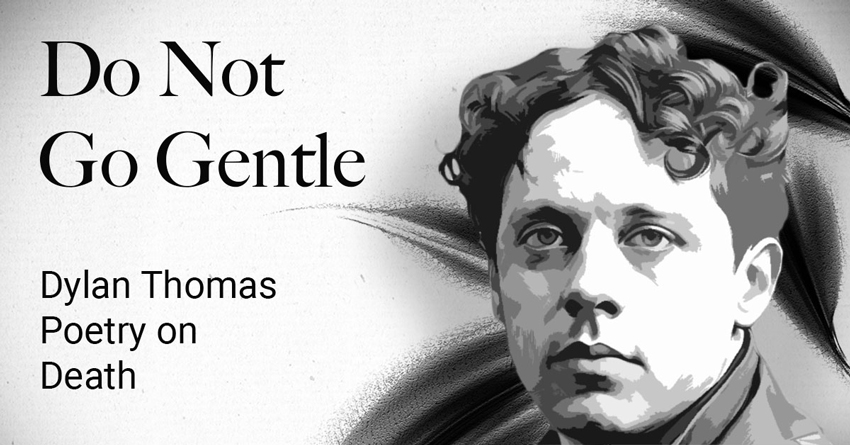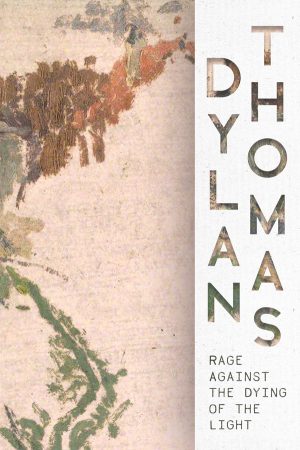A Literary Exploration of Death in the Poetry of Dylan Thomas
Dylan Thomas is remembered in large part for his intensely emotional and beautifully lyrical writing on death. His poetry often confronted the questions others shied away from and he became known for his candid exploration of dark and taboo topics.
Throughout his lifetime and in the decades following his passing, Dylan Thomas’ poetry on death has helped people to deal with loss and understand their feelings of grief. Globally celebrated, he is remembered as one of the most important modernist poets of Wales and Britain, and his work will continue to provide hope for generations.
Discover more of Dylan Thomas’ moving explorations of the complicated themes of grief and loss in our richly powerful collection of poetry. This new, pocket-sized collection of his most evocative poems delves into lyrical examinations of death, loss, and grief. The poetry featured in this volume include ‘And Death Shall Have No Dominion’, ‘Light Breaks Where No Sun Shines’, and ‘Do Not Go Gentle Into That Good Night’.
Collected Poems of Death, Loss and Emotion by Dylan Thomas
Dylan Thomas Poetry on Death
Table of Contents
Who was Dylan Thomas?
Dylan Thomas was born on the 27th of October 1914, and was raised in Swansea on the south-west coast of Wales. Described as a soft, quiet, sickly child, he became a Welsh media star and one of the most recognisable poets of the twentieth century. He’s known for his distinguished syntax style and rhyming verse in poems such as ‘Fern Hill’ (1945) and ‘Do Not Go Gentle Into That Good Night’ (1951), as well as the influential radio drama Under Milk Wood (1954).
The Death of Dylan Thomas
The death of Dylan Thomas has been a topic of controversy for decades. The Welsh poet spent his final days in New York City, rehearsing for the stage adaptation of his radio drama Under Milk Wood. In the early November of 1953, the smog in the city had risen to dangerous levels for those who suffered chest and lung-related illnesses, and as Thomas over worked himself during the day and drank to excess in the evening, he increasingly struggled with his asthma.
On the 4th of November, he spent the day confined to his hotel room by sickness. The poet was visited by Doctor Milton Feltenstein three times and administered with injections of painkillers. During his last visit, the doctor injected Thomas with half a grain of morphine, sending him into a coma from which he never recovered. He passed away in St Vincent’s Hospital on the 9th of November 1953, aged 39.
His death is surrounded by conflicting information due to the media coverage of his allegedly excessive drinking habits and the potentially neglectful medical treatment he received. The great interest in his death may also be due to the prolific exploration of the themes of loss and grief in his work, with his poetry on the subject becoming immensely popular around the world during his lifetime.
Dylan Thomas Poetry on Death
Accompanied by his unique rhyming verse and rich emotional intensity, the poetry of Dylan Thomas commonly explores the poignancy of loss, life, and love with unwavering courage and beauty. One of his most beloved poems, ‘Do Not Go Gentle Into That Good Night’, focuses on the acceptance of death.
After battling throat cancer for almost two years, Thomas’ father passed away just before Christmas in 1952. The two had always had a tense relationship, with the poet’s father being an extremely strict, severe man, but he is thought to have been one of his earliest literary influences.
Written while his father was ill, ‘Do Not Go Gentle Into That Good Night’ is often chosen for funeral readings and gently encourages readers to value the beauty in both life and loss. This lyrical examination of loss is a haunting work that has resonated with many in the decades since its publication.
Do Not Go Gentle Into That Good Night
Do not go gentle into that good night,
Old age should burn and rave at close of day;
Rage, rage against the dying of the light.
Though wise men at their end know dark is right,
Because their words had forked no lightning they
Do not go gentle into that good night.
Good men, the last wave by, crying how bright
Their frail deeds might have danced in a green bay,
Rage, rage against the dying of the light.
Wild men who caught and sang the sun in flight,
And learn, too late, they grieved it on its way,
Do not go gentle into that good night.
Grave men, near death, who see with blinding sight
Blind eyes could blaze like meteors and be gay,
Rage, rage against the dying of the light.
And you, my father, there on the sad height,
Curse, bless, me now with your fierce tears, I pray.
Do not go gentle into that good night.
Rage, rage against the dying of the light.
— Dylan Thomas, 1951
Find this poem and more in our collection of selected poetry by Dylan Thomas:
Dylan Thomas’ Early Life and Illness
In 1925, Thomas enrolled at Swansea Grammar School for Boys, where his father taught English. It was while attending this school that he began to keep notebooks for his poetry, amassing over 200 pieces by the time he was 16.
Despite a relatively happy childhood, the poet reflected on his former years with a saddened sense of his youthful naivety and blissful ignorance. His autobiographical short stories collected in Portrait of the Artist as a Young Dog (1940) explore themes of adolescence, religion, love, and death as he fictionalises his wild and romping childhood in Swansea up until his exuberant days working as a journalist.
He spent much of his life and work traversing the inevitability of death, perhaps due to his wavering health. He struggled with bronchitis and asthma as a boy and continued to be affected by these throughout his adulthood. Even in one of his earliest poems ‘And Death Shall Have No Dominion’ (1933), he explores the idea that death does not have to hold the finality we often associate with it. Instead, he highlights humanity’s cyclical connection to the natural world and celebrates the idea of returning to nature after death.
And Death Shall Have No Dominion
And death shall have no dominion.
Dead men naked they shall be one
With the man in the wind and the west moon;
When their bones are picked clean and the clean bones gone,
They shall have stars at elbow and foot;
Though they go mad they shall be sane,
Though they sink through the sea they shall rise again;
Though lovers be lost love shall not;
And death shall have no dominion.
And death shall have no dominion.
Under the windings of the sea
They lying long shall not die windily;
Twisting on racks when sinews give way,
Strapped to a wheel, yet they shall not break;
Faith in their hands shall snap in two,
And the unicorn evils run them through;
Split all ends up they shan’t crack;
And death shall have no dominion.
And death shall have no dominion.
No more may gulls cry at their ears
Or waves break loud on the seashores;
Where blew a flower may a flower no more
Lift its head to the blows of the rain;
Though they be mad and dead as nails,
Heads of the characters hammer through daisies;
Break in the sun till the sun breaks down,
And death shall have no dominion.
— Dylan Thomas, 1933
Influences in Dylan Thomas’ Poetry
The way in which Thomas discussed the theme of death in his poetry contrasted the workings of his modern contemporaries. Ideas of disillusionment were popular among poets such as Ezra Pound (1885–1972), T. S. Eliot (1888–1965), and Langston Hughes (1901–1967). A sense of despondency was woven through modernist literature and Thomas’ extension of Romantism brought hope to readers. He used the literary Romantic traditions of glorifying emotion and nature to highlight his belief in death being the only positive certainty in life.
His 1934 poem ‘The Force That Through the Green Fuse Drives the Flower’ enforces this idea, using extended metaphor to suggest the ‘force’ that helps all living things grow and thrive is the same as that which destroys and in turn renews them.
The Force That Through the Green Fuse Drives the Flower
The force that through the green fuse drives the flower
Drives my green age; that blasts the roots of trees
Is my destroyer.
And I am dumb to tell the crooked rose
My youth is bent by the same wintry fever.
The force that drives the water through the rocks
Drives my red blood; that dries the mouthing streams
Turns mine to wax.
And I am dumb to mouth unto my veins
How at the mountain spring the same mouth sucks.
The hand that whirls the water in the pool
Stirs the quicksand; that ropes the blowing wind
Hauls my shroud sail.
And I am dumb to tell the hanging man
How of my clay is made the hangman’s lime.
The lips of time leech to the fountain head;
Love drips and gathers, but the fallen blood
Shall calm her sores.
And I am dumb to tell a weather’s wind
How time has ticked a heaven round the stars.
And I am dumb to tell the lover’s tomb
How at my sheet goes the same crooked worm.
— Dylan Thomas, 1934
Explore more books from Dylan Thomas…











